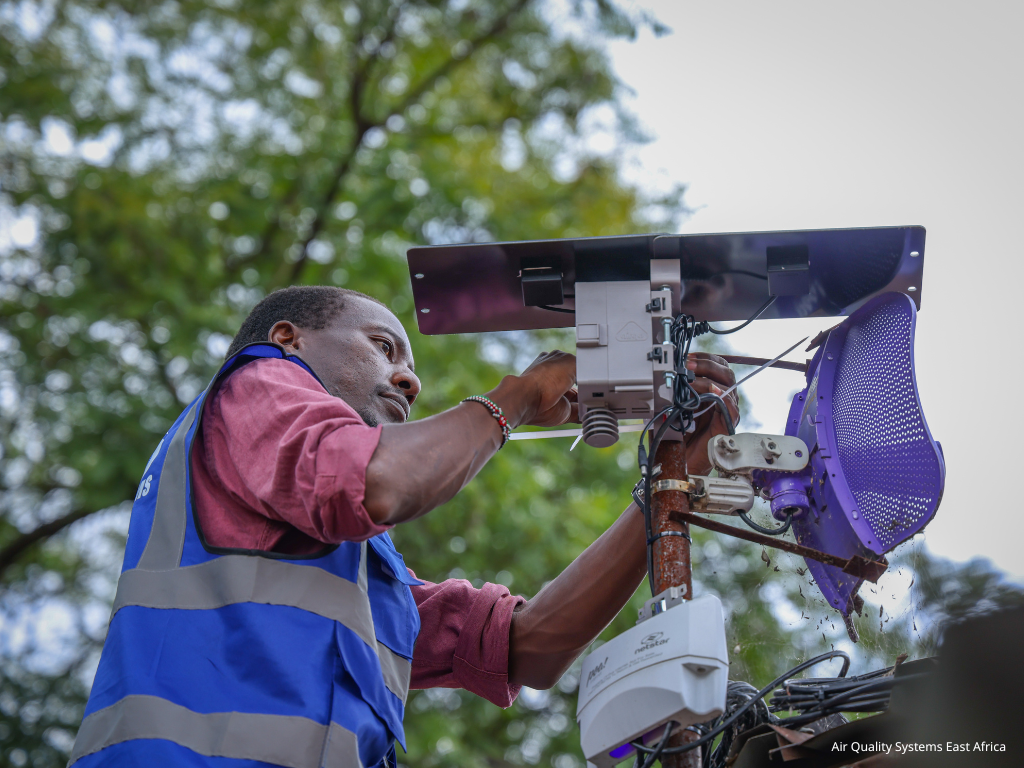Nairobi
Home to 4.3 million people, Nairobi is among East Africa’s largest cities and a regional economic and transport hub. Learn how the Kenyan capital is working with Breathe Cities to improve air quality and ensure its residents breathe cleaner air.




We are equipping our city with the precise, real-time knowledge we need to track pollution hotspots, inform policies, safeguard the health of every single resident and shape a sustainable future for generations to come.
Sakaja Arthur Johnson
Governor of Nairobi

Air pollution in Nairobi
In 2023, the average level of harmful particles in Nairobi’s air was four times higher than the World Health Organization recommends. Most of the harmful particles in the city’s air come from road transport (40%), illegal dumping and burning of waste (25%), and industrial activities (15%).
While these pollutants affect the entire city, the health impacts are disproportionately felt by those on the lowest incomes. Densely populated informal settlements are often located near major roads and industrial facilities, where air pollution levels are higher. In 2019, approximately 2,500 premature deaths—roughly 15% of the city’s total—were attributable to air pollution.
For many Nairobians, the air they breathe each day is quietly putting their health at risk. Cleaning the air can help the city unlock huge benefits – including an estimated $192 million in economic savings by 2040.
In recent years, Nairobi has taken important steps to improve its air quality. The city passed the Nairobi Air Quality Act in 2022 and has set an ambitious goal to reduce emissions by 51% by 2035.

What we're doing in Nairobi
Breathe Nairobi is working with city officials and local communities to help clean the city’s air.
We supported Nairobi’s first city-owned, low-cost air quality monitoring network, with 50 air quality sensors installed across the city at schools, clinics, and urban neighbourhoods. The network will generate real-time data to provide the clearest picture yet of Nairobi’s air pollution hotspots. This data will help Nairobi City County identify priority areas for targeted action and feed into a public air quality data portal to make this information accessible to all.
Alongside this data and research work, we’re providing technical assistance to city officials. By pairing data with technical expertise, we’re helping ensure that Nairobi can take evidence-informed action to clean its air.
Community engagement is also a key part of this effort. Through ongoing communication, advocacy, and public campaigns, Breathe Nairobi is helping involve residents in air quality work, amplifying local voices, building shared understanding, and creating momentum for cleaner air in the city’s neighbourhoods.
In Nairobi, we work with a range of local partners and community groups in our efforts to clean the city’s air, including Kusudi Cause Communication Trust, the Environmental Capacities and Sustainability Institute, the Environmental Compliance Institute, Air Quality Systems East Africa Limited, Cenex Consult Limited, the University of Nairobi, Kikaka CBO, Slum Dwellers International – Kenya, National Public Transport Alliance and Grassroots Organisations Operating Together in Sisterhood – Kenya.
Related Posts
-
 Press Release11/06/2025Nairobi
Press Release11/06/2025NairobiNairobi Takes Action for Clean Air with First City-Owned Air Quality Monitoring Network
Nairobi launches its first city-owned air quality monitoring network—deploying 50 sensors delivering real-time data to… -
 Press Release11/09/2024Nairobi
Press Release11/09/2024NairobiNairobi launches Breathe Cities initiative in fight against air pollution
Nairobi is taking bold steps to tackle air pollution with the Breathe Cities initiative, uniting… -
 Press Release02/12/2023Global
Press Release02/12/2023GlobalBreathe Cities: More cities join global initiative to fight air pollution
Breathe Cities is uniting cities worldwide to combat air pollution, protect public health, and accelerate… -
 Blog07/10/2025Jakarta
Blog07/10/2025JakartaJakarta Students Reimagine a Cleaner City with Minecraft
Through the Schools Reinventing Cities competition, more than 2,000 young people from 324 schools used…



